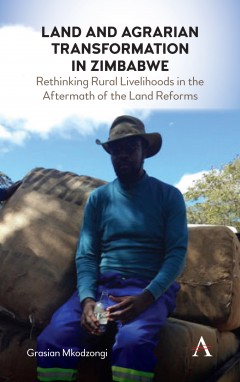Land and Agrarian Transformation in Zimbabwe
Rethinking Rural Livelihoods in the Aftermath of the Land Reforms
By Grasian Mkodzongi
- About This Book
- Reviews
- Author Information
- Series
- Table of Contents
- Links
- Podcasts
About This Book
This book demonstrates that redistributive land reform can transform the lives of poor peasants by removing distortions in the land ownership structure which allows them access to land and other natural resources which are critical for their social reproduction strategies and livelihood security. Furthermore, it shows that the benefits of land reform go beyond gaining access to land in order to farm; off-farm activities such as artisanal gold mining are a key part of rural livelihoods as they provide capital for further agricultural investments. The fact that a large number of peasants engaged in off-farm activities who utilize income gained from such activities to further agricultural investments demonstrates that off-farm activities are inextricably linked to future agrarian investments.
The book further demonstrates that the land reform was a process underpinned by many dynamics which were often localized in character. This means that any analysis of its outcomes must take into account this diversity of experiences. Overall, important lessons can be drawn from the Mhondoro Ngezi case study presented in this book. First, land reform can address historical injustices in the land ownership structure by allowing landless peasants to access land and other natural resources formerly enclosed under the previous agrarian structure. However, the process is not without challenges; a large-scale resettlement of people requires the provision of social infrastructure and other support such as farming inputs. Without such support, it is difficult for land beneficiaries to quickly make investments on their land. Second, and this is linked to the first point, the benefits of land reform are long term; their impact is likely to take longer to realise. Third, redistributive land reform has the potential to radicalize poor peasants, to demand their rights and entitlements to land and natural resources previously enclosed under an unjust land ownership structure and socio-economic relations. Fourth, a radical transformation of property rights in favour of peasants, such as the one undertaken in Zimbabwe, is likely to attract an international backlash from global capital as it is seen as a direct challenge to the neo-liberal regime of property rights.
Reviews
Twenty years after Zimbabwe’s radical land reform, this book challenges the persistent myths about its consequences. Based on detailed fi eldwork documenting the diverse livelihoods emerging on the resettlements, the book explores the intersections of agriculture, mining and other income sources, and the social and political contexts of these new rural communities. For a balanced, empirically informed analysis, this book is essential reading.’—Ian Scoones, Professor, Institute of Development Studies, University of Sussex, UK
‘In the best of Zimbabwe’s intellectual traditions, Grasian Mkodzongi takes forward the analysis of agrarian transformation, demonstrating the tectonic shifts in the countryside after land reform, the benefits of redistribution and the new contradictions. A must-read for those interested in alternatives.’—Paris Yeros, Professor, Federal University of ABC, São Paulo, Brazil
Author Information
Grasian Mkodzongi is an executive director at the Tropical Africa - Land and Natural Resources Research Institute (Tropical Africa LNRRI) based in Harare, Zimbabwe.
Series
International Environmental Policy Series
Table of Contents
Abbreviations; Chapter One: Introduction: An Overview of Zimbabwe’s Land Reform Program, 2000–2020; Chapter Two: Reclaiming the land in Mhondoro Ngezi; Chapter Three: Land beneficiaries and their origins; Chapter Four: Governing the land after the land reform; Chapter six: ‘Turning Strangers into Neighbours’: Social organisation and agency after the land reforms; Chapter Seven: Conclusions; Bibliography; Archival files; Newspaper articles; List of interviews; List of meetings; Index.
Links
Stay Updated
Information
Latest Tweets



